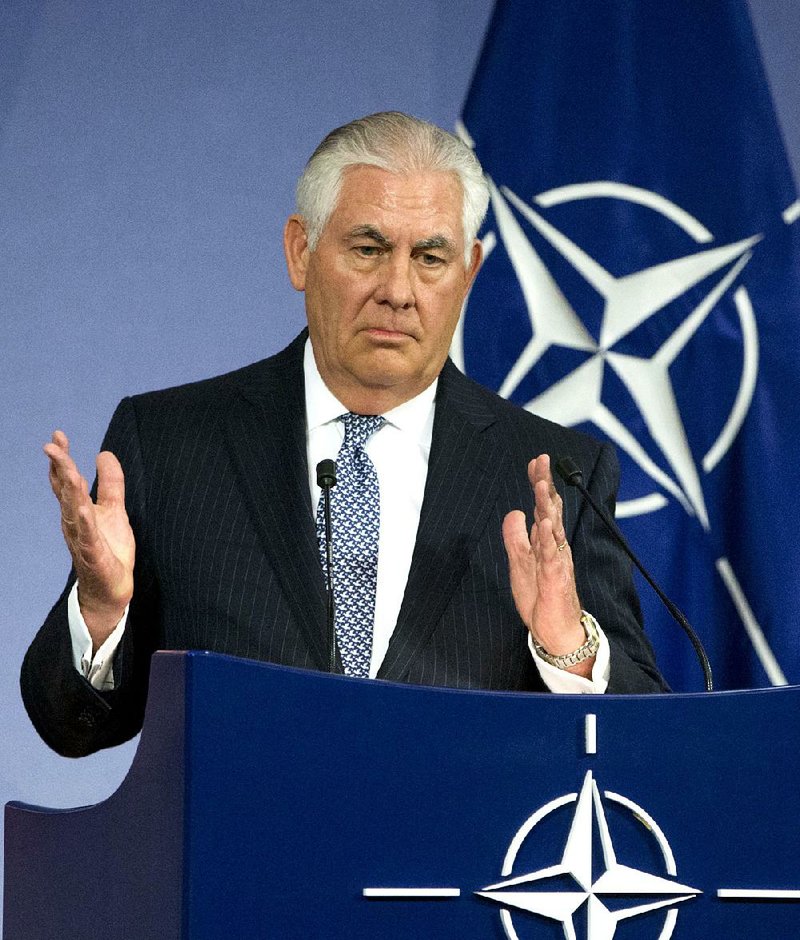BRUSSELS -- Nearly a year after the State Department discovered that something terrible had happened to diplomats and their spouses posted in Havana, Secretary of State Rex Tillerson said Wednesday that the United States remained convinced the personnel were victims of "targeted attacks."
Tillerson also suggested that Cuba could have stopped the attacks, which the State Department has said left 24 people, who are associated with the U.S. Embassy in Havana, with medical problems.
His remarks came after The Associated Press reported that medical tests had revealed perceptible physical changes in the brains of some of the diplomats, leading experts to become increasingly skeptical that the attackers had used a sonic weapon, which had been initially suspected because the diplomats reported strange sounds in their homes or hotels.
Sonic weapons do not cause the kind of physical changes seen in the personnel, experts have said. Instead, the sounds may have been a byproduct of something else that caused the damage, the AP reported.
The United States has never accused the Cuban government of perpetrating the attacks, but officials have said Cuba, as the host government, was responsible for ensuring the safety of its diplomats and their spouses.
Tillerson made clear that no matter who was behind the attacks, Cuba was to blame.
"What we've said to the Cubans is: small island. You've got a sophisticated security apparatus. You probably know who is doing it. You can stop it. It's as simple as that."
Adding to the mystery, the Canadian Embassy has reported that some of its personnel were sickened. Canada and Cuba have long had friendlier relations than those between the United States and Cuba.
The U.S. government realized in January that something had happened, but months of testing were needed to identify all 24 people affected.
In the wake of the attacks, President Donald Trump expelled 15 Cuban diplomats from the United States, the most serious of a series of actions he has undertaken to unwind the detente between the countries undertaken by President Barack Obama.
Obama sought to end the hostility and mistrust that had characterized the countries' relationship for more than a half-century, and regarded the resumption in relations as one of his foreign policy legacies.
The State Department said the expulsion of the diplomats was intended to force Cuba to place its embassy in Washington, where the diplomats were stationed, on the same emergency status that the United States is now operating under in Havana after it decided to pare its staff there down to 27 people.
Foreign Minister Bruno Rodriguez of Cuba said in November that the expulsions were unwarranted and complained that the U.S. had not cooperated with the Cuban authorities in its investigation.
In his first response to Rodriguez, Tillerson said he would not allow officials to share private information with the Cubans or provide "whoever is orchestrating these attacks with information that's useful to how effective they were."
"We understand the Cubans don't like the actions we've taken," Tillerson added. "We don't like our diplomats being targeted."
In response to a question about plans by John Kelly, the White House chief of staff, to replace Tillerson with Mike Pompeo, the CIA director, Tillerson denied the accuracy of the reports.
"This is a narrative that keeps coming up every six weeks," Tillerson said. "I would say that you all need to get new sources because your story keeps being wrong."
Medical testing has revealed the embassy workers developed changes to the white matter tracts that let different parts of the brain communicate, several U.S. officials told the AP, describing a growing consensus held by university and government physicians researching the attacks. White matter acts like information highways between brain cells.
Doctors still don't know how victims ended up with the white matter changes, nor how exactly those changes might relate to their symptoms.
But acoustic waves have never been shown to alter the brain's white matter tracts, said Elisa Konofagou, a biomedical engineering professor at Columbia University who is not involved in the government's investigation.
Information for this article was contributed by Gardiner Harris of The New York Times and by Josh Lederman and Lauran Neergaard of The Associated Press.
A Section on 12/07/2017

